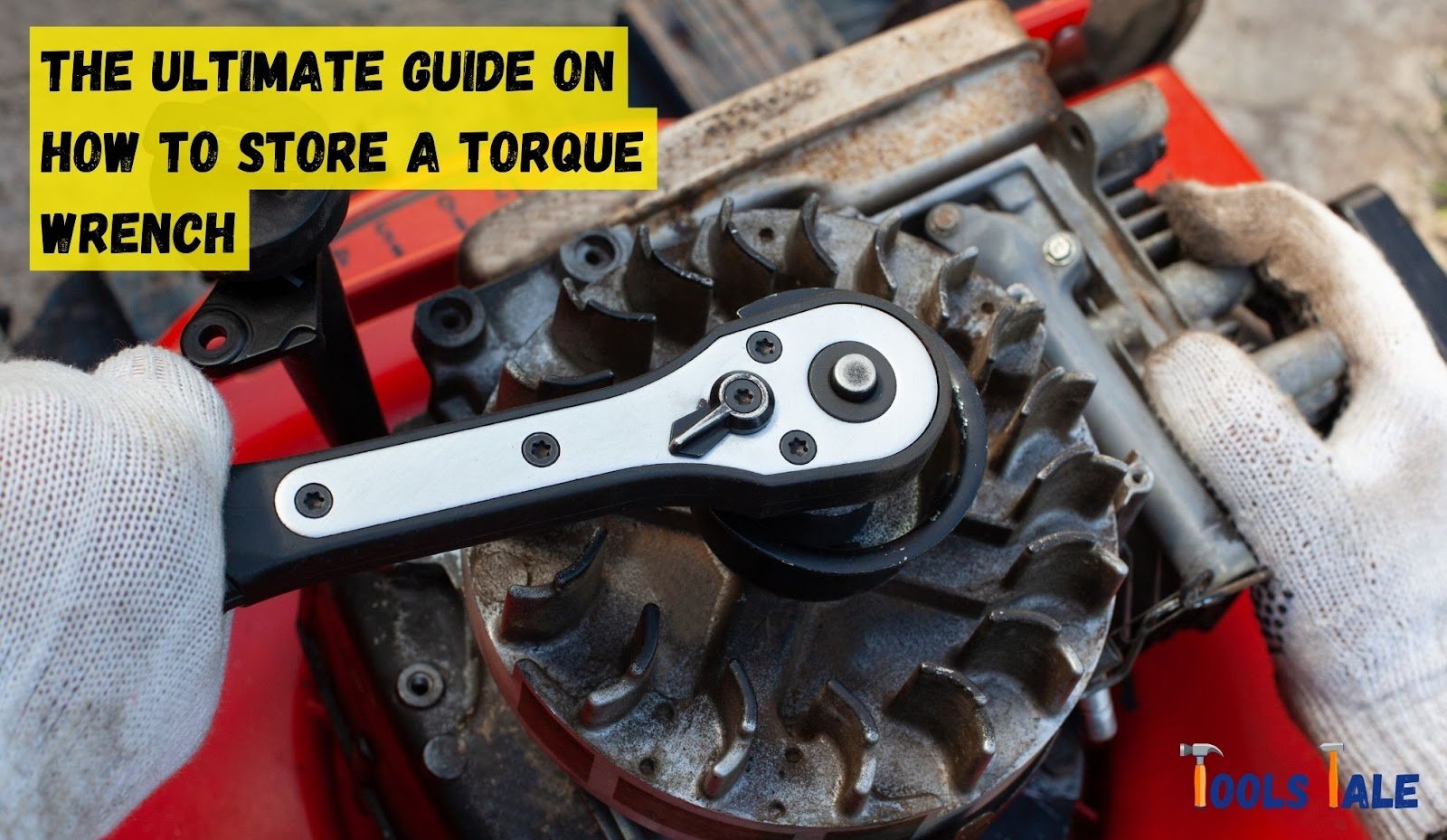Physical Address
304 North Cardinal St.
Dorchester Center, MA 02124
Physical Address
304 North Cardinal St.
Dorchester Center, MA 02124

Got a torque wrench and not sure where to stash it when the job’s done? You’re in the right place! Knowing how to store a torque wrench properly is like giving your trusty tool a cozy home. Whether you’re a seasoned pro or just getting started, this quick guide will spill the beans on the best ways to keep your torque wrench in top-notch shape.
From cleaning tips to secret storage tricks, we’ve got you covered. So, let’s dive in and make sure your torque wrench is always ready for action!
Key Summary: How to Store a Torque Wrench?
Properly Store a torque wrench effectively: Keep it clean, dry, and calibrated. Store it in a protective case, maintain a controlled environment, and hang it vertically. Release tension, and apply light oil for longevity.
Before we dive into storage tips, let’s briefly understand what a torque wrench is. A torque wrench is a specialized tool used in various industries, including automotive, construction, and engineering. Its primary function is to tighten bolts and nuts to a specific level of torque, measured in pound-feet (lb-ft) or Newton-meters (Nm).
Before we delve into the fine art of storage, let’s take a moment to understand the different types of torque wrenches and what makes each of them tick.
Imagine a seesaw with a pointer attached. That’s essentially what a beam torque wrench is. When you apply torque, the wrench’s beam deflects, and the pointer moves along a scale to indicate the applied force. It’s a straightforward design, making beam torque wrenches easy to use and maintain.
Click torque wrenches are more complex, featuring an internal mechanism that emits a “click” sound when you reach the preset torque level. This click serves as an indicator that you’ve applied the correct force. These wrenches are popular for their accuracy and ease of use.
Electronic and digital torque wrenches take precision to a whole new level. They use electronic sensors to measure torque and display the readings digitally. Some even provide audio or visual signals to indicate when the desired torque has been achieved. These high-tech wrenches are commonly used in professional settings.
Storing a torque wrench may seem like a simple task, but doing it correctly can extend the life of your tool and ensure its accuracy for future projects. Let’s walk through a step-by-step guide on how to store your torque wrench effectively:
Begin by cleaning your torque wrench thoroughly. Use a clean, dry cloth to wipe off any dirt, grease, or debris that may have accumulated during use. Pay close attention to the moving parts and crevices where contaminants can hide. Cleaning your wrench prevents corrosion and ensures it stays in good condition.
After cleaning, inspect the wrench for any visible damage or signs of wear, such as bent handles or cracks in the casing. Identifying issues early allows you to address them before they become more significant problems.
If your torque wrench is adjustable, lower it to the lowest torque setting available. This step is crucial because it relieves tension on the internal spring or mechanism. By reducing the internal stress, you prevent the wrench from losing calibration while in storage.
Select an appropriate storage location for your torque wrench. Ideally, you should keep it in a protective case or toolbox specifically designed for storing tools. These containers provide cushioning and protection against external factors like moisture, dust, and physical impact. If you’re using a toolbox, ensure it has a designated slot or compartment for the torque wrench to prevent it from moving around and potentially getting damaged.
Whenever possible, store your torque wrench in an upright position. Hanging it on a pegboard or placing it vertically in a tool chest drawer is ideal. This position minimizes the risk of bending the tool or causing misalignment. Avoid laying the wrench flat or leaning it against other tools.
Consider the storage environment carefully. Extreme temperatures and humidity can harm your torque wrench. Store it in a controlled area where temperature and humidity levels remain stable. Avoid exposing it to direct sunlight, as prolonged exposure can negatively impact the internal components.
Give your torque wrench a touch of care by applying a light coat of lubricant to its moving parts. This step helps prevent rust and ensures that the internal components operate smoothly when you use the tool again. Think of it as providing your wrench with a little pampering session.
Don’t forget about your torque wrench while it’s in storage. Periodically check it for any signs of damage or calibration issues. Conduct a quick calibration test to ensure it’s still accurate before using it for critical tasks. Regular maintenance checks ensure that your torque wrench remains in top working condition.
Strong magnetic fields can interfere with your torque wrench’s calibration and accuracy. Avoid storing it near magnetic sources to prevent any unintended calibration shifts. Magnetic interference can lead to inaccurate torque readings, which can be problematic for your projects.

Storing a torque wrench safely after use is crucial to maintain its accuracy and reliability. Here, we’ll explore the specific steps you should take to ensure your torque wrench remains in excellent condition and ready for your next project.
Begin by cleaning your torque wrench meticulously. Remove any dirt, grease, or debris that may have accumulated during use. Use a clean, dry cloth to wipe down all surfaces, paying close attention to the moving parts and any crevices where contaminants can hide. A clean wrench is less likely to suffer from corrosion or damage during storage.
If your torque wrench came with a dedicated case, it’s best to use it. Original cases are designed to provide a snug and protective fit for your tool. They offer an extra layer of defense against dust, moisture, and physical damage. If your torque wrench didn’t come with a case, consider investing in one for added protection.
As mentioned earlier, controlling the environment is crucial for safe storage. Keep the storage location at a stable temperature and humidity level. Fluctuations in temperature and humidity can lead to condensation, which can be harmful to your torque wrench. Using a dehumidifier or temperature-controlled storage area can help maintain ideal conditions.
Before storing your torque wrench, always release the torque setting to its lowest reading. This step ensures that the internal spring or mechanism is relaxed during storage. Failing to unload the wrench can cause undue stress and affect its calibration over time.
While it’s essential to unload the wrench before storage, it’s also a good practice to store it at the lowest torque setting available. Storing the wrench at its lowest reading minimizes internal stress and further reduces the risk of calibration drift during storage.
Lastly, choose a safe and secure location for storing your torque wrench. Keep it out of reach of children or anyone who might mishandle or misuse the tool. A locked toolbox or cabinet can be an excellent choice to ensure that only authorized users have access to it.

Storing a torque wrench properly after use is not just a matter of convenience; it’s a critical step in maintaining the tool’s accuracy and performance. Here are some compelling reasons why you should prioritize proper storage:
Torque wrenches are precision tools designed to apply a specific amount of force. Storing the wrench at a lower torque setting relieves tension on the internal spring or mechanism, preventing it from becoming stressed and losing calibration. This ensures that your torque wrench provides accurate torque readings when you need them.
Proper storage protects your torque wrench from physical damage, moisture, and dust. A clean and well-maintained wrench is less likely to suffer from corrosion and wear over time. By safeguarding your tool, you extend its lifespan, saving you money on replacements.
Accurate torque application is crucial for the safety and integrity of your projects. Storing your torque wrench correctly helps maintain its accuracy, reducing the risk of overtightening or under-tightening bolts and nuts. This, in turn, enhances the safety of your work.
A torque wrench that’s ready for use when you need it saves you valuable time and effort. Proper storage eliminates the need for last-minute checks, calibrations, or tool replacements, allowing you to complete your projects efficiently.
Neglecting proper storage practices can lead to premature wear and damage to your torque wrench. Replacing a damaged or inaccurate torque wrench can be costly. By storing it correctly, you avoid unnecessary expenses and ensure your tool remains an asset.
In conclusion, mastering the art of how to store a torque wrench is a fundamental skill for any tool enthusiast or professional. Following the proper techniques, such as cleaning, setting to the lowest torque reading, using a protective case, and controlling the storage environment, you can guarantee the accuracy and longevity of your torque wrench.
Regular maintenance checks and a watchful eye on storage conditions will ensure that your tool remains reliable, ready for action, and continues to deliver precise torque measurements for all your projects.
Your torque wrench should be stored at its lowest torque setting. Storing it at this setting helps relieve internal stress on the wrench’s mechanism, ensuring it remains accurate and calibrated over time.
Long-term storage of a torque wrench requires proper cleaning, setting it to the lowest torque reading, placing it in a protective case, controlling the storage environment, and periodic maintenance checks. These steps maintain accuracy and extend its lifespan.
Storing a torque wrench improperly can lead to calibration drift, reduced accuracy, and potential damage. It may result in inaccurate torque readings, compromising the safety and integrity of your projects.
Yes, you should store a CDI torque wrench following the same guidelines as any other torque wrench. Proper cleaning, setting it to the lowest torque reading, using a protective case, and controlling the storage environment are essential.
Maintaining a torque wrench involves regular cleaning, calibration checks, lubrication of moving parts, and proper storage. Performing these tasks ensures that the tool remains accurate and reliable over time.
Yes, temperature can affect the accuracy of a torque wrench. Extreme temperatures can lead to changes in the wrench’s materials, causing it to expand or contract. This can impact torque readings, making it essential to store the wrench in a stable environment.